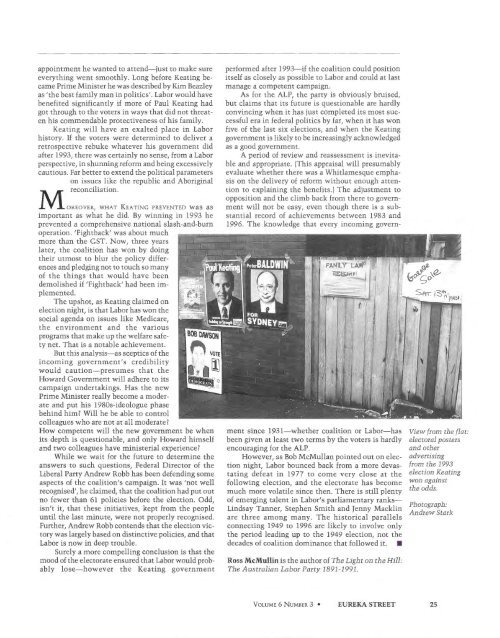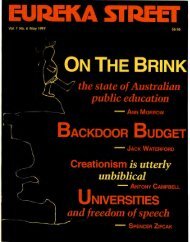Shane Malone - Eureka Street
Shane Malone - Eureka Street
Shane Malone - Eureka Street
You also want an ePaper? Increase the reach of your titles
YUMPU automatically turns print PDFs into web optimized ePapers that Google loves.
appointment he wanted to attend-just to make sure<br />
everything went smoothly. Long before Keating became<br />
Prime Minister he was described by Kim Beazley<br />
as 'the best family man in politics'. Labor would have<br />
benefited significantly if more of Paul Keating had<br />
got through to the voters in ways that did not threaten<br />
his commendable protectiveness of his family.<br />
Keating will have an exalted place in Labor<br />
history. If the voters were determined to deliver a<br />
retrospective rebuke whatever his government did<br />
after 1993, there was certain! y no sense, from a Labor<br />
perspective, in shunning reform and being excessively<br />
cautious. Far better to extend the political parameters<br />
on issues like the republic and Aboriginal<br />
reconciliation.<br />
M OREOVER, WHAT KEATING PREVENTED was as<br />
important as what he did. By winning in 1993 he<br />
prevented a comprehensive national slash-and-burn<br />
operation. 'Fightback' was about much<br />
more than the GST. Now, three years<br />
later, the coalition has won by doing<br />
their utmost to blur the policy differences<br />
and pledging not to touch so many<br />
of the things that would have been<br />
demolished if 'Fightback' had been implemented.<br />
The upshot, as Keating claimed on<br />
election night, is that Labor has won the<br />
social agenda on issues like Medicare,<br />
the environment and the various<br />
programs that make up the welfare safety<br />
net. That is a notable achievement.<br />
But this analysis-as sceptics of the<br />
incoming government 's credibility<br />
would caution-presumes that the<br />
Howard Government will adhere to its<br />
campaign undertakings. Has the new<br />
Prime Minister really become a moderate<br />
and put his 1980s-ideologue phase<br />
behind him Will he be able to control<br />
colleagues who are not at all m oderate<br />
How competent will the new governm ent be when<br />
its depth is questionable, and only Howard himself<br />
and two colleagues have ministerial experience<br />
While we wait for the future to determine the<br />
answers to such questions, Federal Director of the<br />
Liberal Party Andrew Robb has been defending some<br />
aspects of the coalition's campaign. It was 'not well<br />
recognised', he claimed, that the coalition had put out<br />
no fewer than 61 policies before the election. Odd,<br />
isn't it, that these initiatives, kept from the people<br />
until the last minute, were not properly recognised.<br />
Further, Andrew Robb contends that the election victory<br />
was largely based on distinctive policies, and that<br />
Labor is now in deep trouble.<br />
Surely a more compelling conclusion is that the<br />
m ood of the electorate ensured that Labor would probably<br />
lose-however the Keating government<br />
performed after 1993-if the coalition could position<br />
itself as closely as possible to Labor and could at last<br />
manage a competent campaign.<br />
As for the ALP, the party is obviously bruised,<br />
but claims that its future is questionable are hardly<br />
convincing when it has just completed its most successful<br />
era in federal politics by far, when it has won<br />
five of the last six elections, and when the Keating<br />
government is likely to be increasingly acknowledged<br />
as a good government.<br />
A period of review and reassessment is inevitable<br />
and appropriate. (This appraisal will presumably<br />
evaluate whether there was a Whitlamesque emphasis<br />
on the delivery of reform without enough attention<br />
to explaining the benefits.) The adjustment to<br />
opposition and the climb back from there to government<br />
will not be easy, even though there is a substantial<br />
record of achievements between 1983 and<br />
1996. The knowledge that every incoming government<br />
since 1931-whether coalition or Labor-has<br />
been given at least two terms by the voters is hardly<br />
encouraging for the ALP.<br />
However, as Bob McMullan pointed out on election<br />
night, Labor bounced back from a more devastating<br />
defeat in 19 77 to come very close at the<br />
following election, and the electorate has become<br />
much more volatile since then. There is still plenty<br />
of em erging talent in Labor's parliamentary ranks<br />
Lindsay Tanner, Stephen Smith and Jenny Macklin<br />
are three among many. The historical parallels<br />
connecting 1949 to 1996 are likely to involve only<br />
the period leading up to the 1949 election, not the<br />
decades of coalition dominance that followed it. •<br />
Ross McMullin is the author of The Light on the Hill:<br />
The Australian Labor Party 1891-1991.<br />
View from the flat:<br />
electoral posters<br />
and other<br />
advertising<br />
from the 1993<br />
election Keating<br />
won against<br />
the odds.<br />
Photograph:<br />
Andrew Starl<<br />
V OLUME 6 NUMBER 3 • EUREKA STREET<br />
25
















